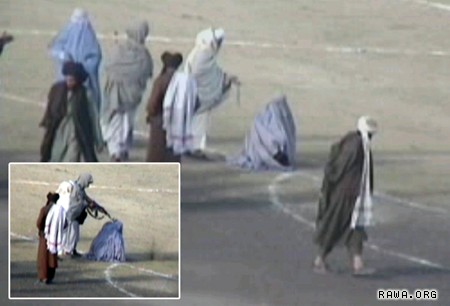GENEVA : The UN High Commissioner for Human Rights Navi Pillay on Thursday urged the Afghan Government to rescind a new law, reportedly signed by President Karzai earlier this month, saying it would seriously undermine women's rights in Afghanistan and contravene the Afghanistan constitution as well as universal human rights standards.

Zarmeena an Afghan women who was publicly executed by Taliban in Ghazi sports stadium in Kabul on 17 Nov. 1999. (Photo: RAWA)
The new law, which has not yet been published, was passed by the two houses of Afghanistan's parliament before proceeding for signature by the President. It regulates the personal status of Afghanistan's minority Shi'a community members, including relations between women and men, divorce and property rights.
"This is another clear indication that the human rights situation in Afghanistan is getting worse not better," Pillay said. "Respect for women's rights – and human rights in general – is of paramount importance to Afghanistan's future security and development. This law is a huge step in the wrong direction."
The new law denies Afghan Shi'a women the right to leave their homes except for "legimitate" purposes; forbids women from working or receiving education without their husbands' express permission; explicitly permits marital rape; diminishes the right of mothers to be their children's guardians in the event of a divorce; and makes it impossible for wives to inherit houses and land from their husbands – even though husbands may inherit immoveable property from their wives.
"For a new law in 2009 to target women in this way is extraordinary, reprehensible and reminiscent of the decrees made by the Taliban regime in Afghanistan in the 1990s," Pillay said.
Afghanistan's Shi'a community, composed mainly but not exclusively of the Hazara minority, represents around 10 per cent of Afghanistan's population, and the new law has the active support of some of the Hazaras' male leadership, although it has been strongly opposed by other Hazaras and Afghan human rights campaigners throughout the country. There are concerns the law will establish precedents that will adversely affect all Afghan women.
The High Commissioner cited a number of other human rights set-backs in Afghanistan that have been undermining efforts to build the rule of law in the country.
"Freedom of expression by media and civil society activists has come under increasing assault," Pillay said. "There has been no progress in ensuring justice or accountability for past war crimes and crimes against humanity, which have characterized decades of warfare and lawlessness. Impunity is widespread, deeply entrenched, and an impediment to ending the pervasive and ongoing violation of human rights. And, after a moratorium of some years, the Government has recently reactivated the death penalty despite a deeply flawed judicial system."
The intensifying armed conflict in Afghanistan has also had disastrous consequences for civilians, with a 40 per cent increase in civilian casualties during 2008.



